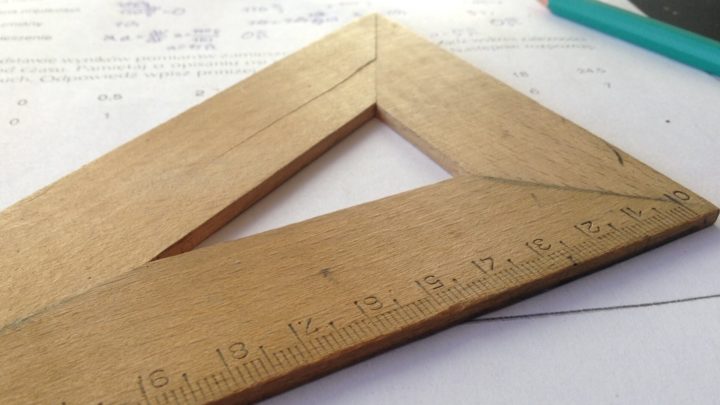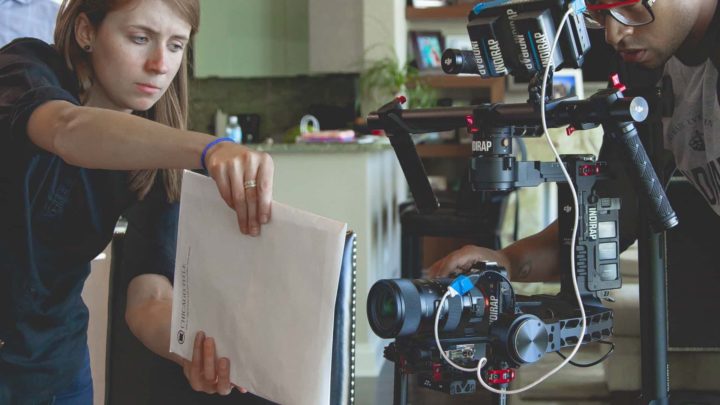Depending on who you ask, the script supervisor is the savior of any production or a nagging pain in the butt who slows down production and ruins amazing takes.
Both are true.
If you have a close attention to detail, take amazing notes, and see the bigger picture, then script supervisor might be the perfect job for you.
Depending on who you ask, the script supervisor is the savior of any production or a nagging pain in the butt who slows down production and ruins amazing takes.
Both are true.
If you have a close attention to detail, take amazing notes, and see the bigger picture, then script supervisor might be the perfect job for you.
WHAT IS A SCRIPT SUPERVISOR?
Back in the day, script supervisors were called “Script Gals.” It was one of the very few positions Old Hollywood would staff up with women -- unless shooting was in a location that might be too much for their “delicate constitutions.”
These days, though, script supervisors can be anyone, and their main job is ensure that all the separate takes can be turned into one complete, whole motion picture.
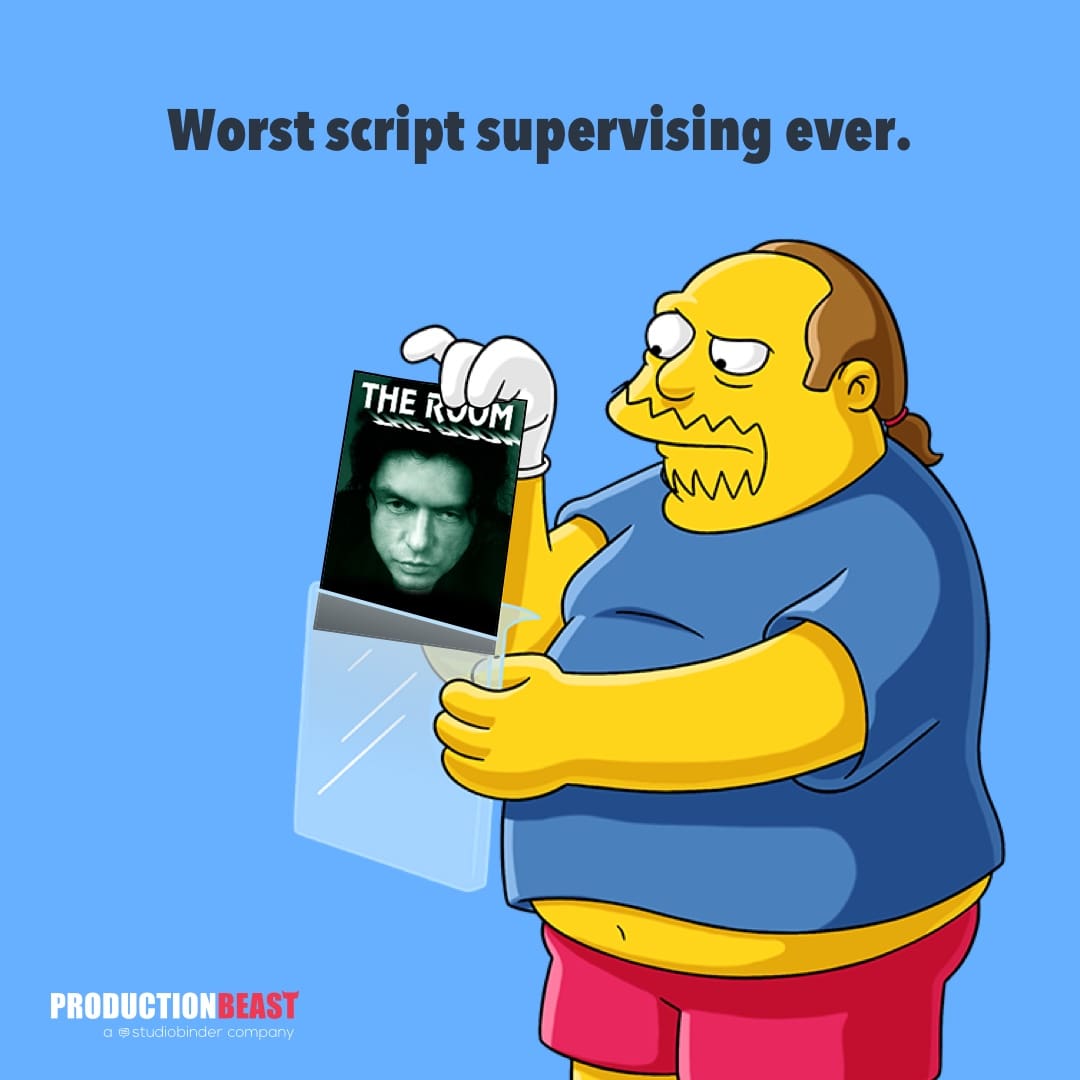
Comic Book Guy wouldn't be a fan of Tommy Wiseau's flick, The Room (2003)
GUARDIAN OF CONTINUITY
In simple terms: the script supervisor (also known as a “scripty” or “continuity supervisor”) is the protector of the continuity of the screenplay, and thus, the continuity of the film.
While everyone else is laser focused on their individual moments and duties, the script supervisor has to look at the shoot in the bigger picture. Can all of the takes shot that day be turned into a coherent whole in the editing room?
Are there any glaring continuity errors? Or even minor continuity errors? From day to day, or even hour to hour, the script supervisor has to make sure the hair, makeup, clothing, props, and set dressing all line up.
Some of these things might seem small and irrelevant, and while it is true small continuity errors can go unnoticed, they do start to add up. And in our internet age, it’s easier than ever for people to notice problems.
Screenplays and reports
The script supervisor is also responsible for keeping the most current version of the shooting script -- any changes made on set are recorded by the script supervisor as production notes.
They update these changes into the shooting script and, if necessary, distribute new copies of the script to the crew. This is, incidentally, where all the various screenplay colors comes from.
Each color represents a new draft marked up with a new set of changes and production notes. When people get a new shooting script, they can immediately turn to the different color and see what has changed.
While they’re doing all of this, they’re also keeping track of the different takes and shots and how they relate to the screenplay -- all this information will be compiled into production reports for the crew and editor’s notes for the editor.
In essence, the script supervisor acts as the records keeper for the show. They’re the ones who note if anything changes and give context to the editor, rather than just dumping a screenplay and a collection of video files on their desk. Having software like StudioBinder handy can keep track of all the revisions for you.A Department of one
The script supervisor is sometimes called the “Department of One”.
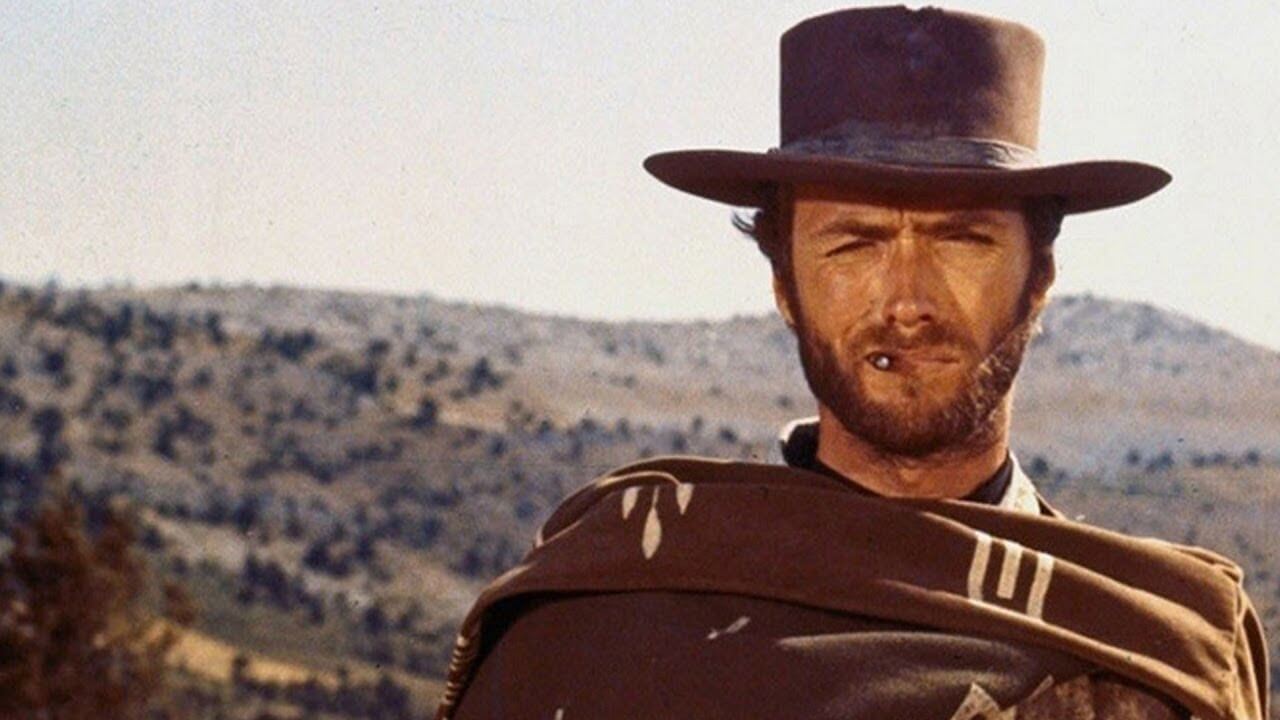
We encourage all script supervisors to think of themselves as a lone cowboy. It's fun!
They don’t belong to any department, and in fact are listed under “Miscellaneous Crew” in the credits. They don’t even technically report to anyone on set -- the script supervisor sends editor and production notes along to the editor.
But it’s not like the editor gives them direct orders.
This can put the script supervisor in a bit of an odd position. They never make any actual decisions on set -- that is to say, the script supervisor can’t stop a shoot if there’s a problem. That’s the purview of the director.
Nor can they order changes to any of the artistic elements they realize are out of sync -- that’s the purview of the department heads and their keys.
Ultimately, the script supervisor is there in an advisory position, representing the interests of someone who’s come before (the writer of the screenplay) and who comes after (the editor), along with the continuity in the film.
What is a script supervisor’s skillset?
There is a lot to being a script supervisor, and it would be simplistic that a scripty needs to be organized, have a comprehensive understanding of the screenplay, and take good production notes.
It’s kind of thing that is technically true, but doesn’t paint the whole picture. That is the most basic listing of a script supervisor’s skills.
But it’s so much more than that.
1. Paying attention to the details
Being a good script supervisor means you need to have an incredible eye for detail. Costumes, hair, eyelines, even how many peas there are on a plate, nothing is too small for your notice.
You’ll soon discover that lunch is your greatest enemy -- the moment where everyone breaks for an hour and forgets everything they had worked on up until that point.
This means you need to have a finger in every pie.
The costume department, the art department, even the lighting department all fall under your watchful eye. Check in with each department head, know what’s up for the day and how it looked when the day end.
Let them know when the day is over what state costumes, hair, and makeup were all in. Technically, it’ll be the costume designer’s job to remember that the actress’s jacket was ripped in her knife fight, but they’re counting on you to be their backup.
Of course, to do that, you’ll need to be able to remember all of this.
2. Taking good notes
Script supervisors have a LOT of information they need to keep track of. A good memory is key, but more important is good note-taking skills.
Many script supervisors like to take production notes with pen and paper -- marking up their copies of the screenplay and using script supervisor forms to keep track of all the details.
However, we live in a digital age, and it’s becoming increasingly more common to use a program like ScriptE, an iPad, and a digital stylus.
At the end of the day, you will be transforming your production notes into a new shooting script, editor’s notes, and a production report.
So it’s more important that your production notes make sense and help you remember than make sense to anyone else.
That being said, there’s no need to reinvent the wheel -- riff off of an existing template or use the production reports that scriptE can automatically create for you.
As long as you keep accurate track of everything, that’s all that matters.
3. Being a polite pain in the butt
There’s no getting around the fact that as a script supervisor, part of your job is to be a professional annoyance.
The rest of the crew appreciates all your good record keeping -- maintaining the shooting scripts and adding the production notes.
But even the most tolerant of crewmembers will start to lose their patience with you the thirteenth time you point out their brilliant lighting set-up is out of sync with where the sun was.
People skills help with every job on a film set, but they are essential to being a great scripty. You’ll be giving people more work to do simply by doing your job.
They’ll be much more forgiving if you’re endear yourself to them early on and make it as painless as possible.
This is especially true of directors. As the final authority on a film set, some directors don’t take challenges easily.
Confident directors will ask you what you noticed, make a judgement, then make the call accordingly. Directors with that level of self-confidence (not arrogance) and worth their weight in gold.
Make sure to mark them as favorites on ProductionBeast so you know you want to work with them again.
Less confident directors won’t like being told something is wrong. While you can’t do much about their confidence, a good way to deliver bad news is to frame it as a question.
Instead of: “We need to do it again, he’s wearing his vest at the end of this shot.”
Try: “Is it okay that he has his vest on at the end of this shot? He’s not wearing it in the next take.”
Questions give the less confident director a feeling of deference and control, and cost you next to nothing.
4. seeing the bigger picture
Having a comprehensive view of the screenplay is a major part of the script supervisor’s skills.
Being on set is a wild, energizing experience. Everyone’s focus is on the scene in the moment--making it as amazing and beautiful as it can be.
But you’re not trying to make a scene -- you’re trying to make a movie.
Your job is to see how this scene fits into the larger continuity of the screenplay.
This is why part of a script supervisor’s job is updating the shooting script with production notes.
It’s because the script supervisor has to be able to look twenty pages ahead in the screenplay and point out that, yes, that take was amazing, but he really does need to mention his mother, or the big scene on page 45 won’t make sense.
5. Knowing when to accept defeat
You’ve marked up a screenplay to hell and back on scriptE.
You’ve logged your production reports and sent production notes to the editor. You kept careful track of everything, and pointed out every time something went wrong.
There were only a few fights, and they were small ones!
You sit down at the film’s premiere and when the lights go down you see that…
They used the wrong take anyway.
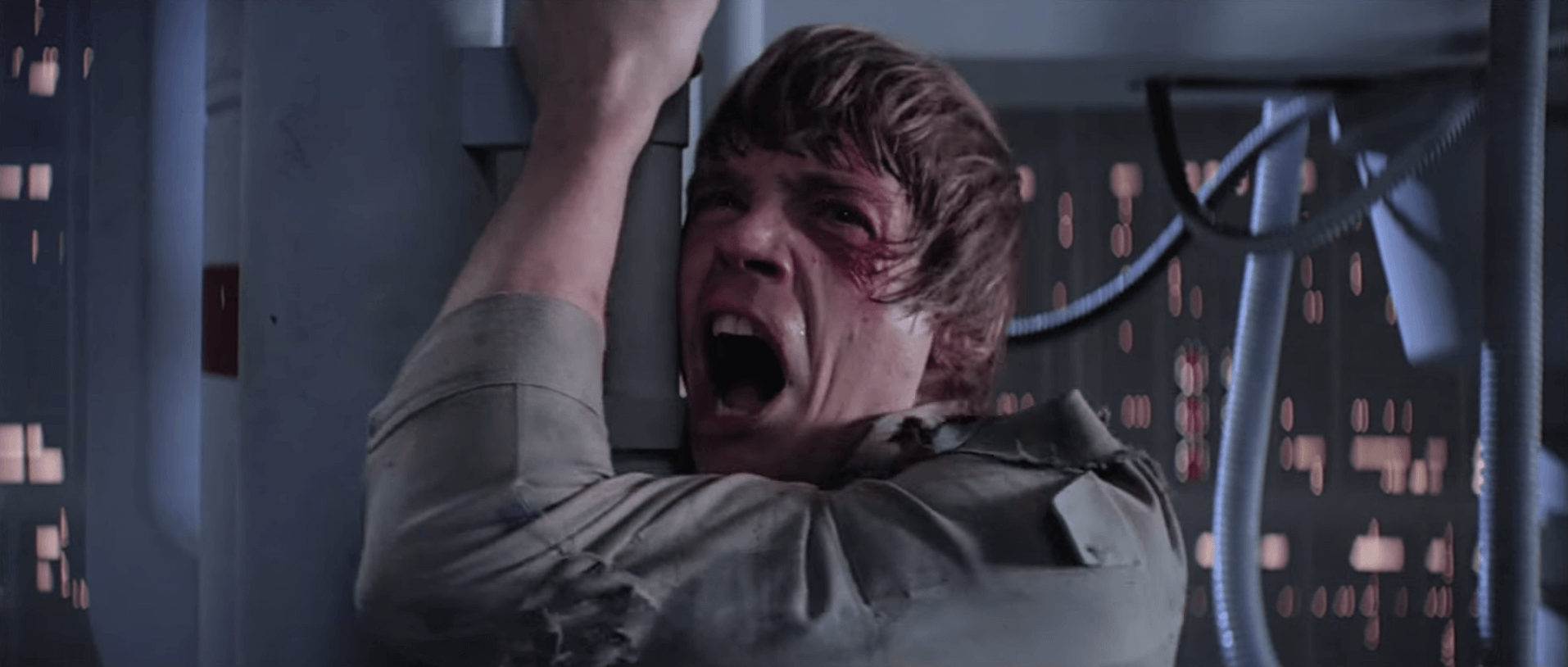
Insert Star Wars continuity joke here.
Learning to accept defeat arguably the most important script supervisor tip we can give you.
It is, ultimately, not your choice whether things get shot, or which takes get used.If a performance is just that brilliant, the director and editor might use it anyway, even if it does cause a continuity error.
If a shoot is running out of daylight, a director and 1st AD might just decide to keep the take anyway -- there’s simply no time to touch up an actor’s costume, we’ve got to move.
That’s okay. You did the best you could. Stand up for yourself and never keep quiet if you see a problem, but don’t take failure or the choices of others on yourself.
You’re a professional script supervisor, and those are the breaks sometimes.
How to get a job as a script supervisor
The script supervisor isn’t really part of the hierarchy of the film set, beyond the general rule of the director being in charge, which means there’s not really a ladder you have to climb to get to the top.
Still, getting a job is not as simple as submitting your resume to ProdutionBeast listings.1. Get on Set
While a friend who knows just how organized you are might hire you directly out of college, most producers are going to want to see a hearty collection of film work before they hire you.
The best way to get hired as a script supervisor is to get some time in on a set as a production assistant.
This isn’t just to burnish your resume -- until you’ve experienced the chaos of an actual shooting set, all your schooling and finely honed note taking skills don’t mean anything.
Be the best PA you can possibly be on set, and make friends with the script supervisor if there is one.
Even if there isn’t one, watch how everything fits together -- notice where mistakes are made.
Soon you’ll be paid to notice them.
2. Keep in Touch
There are few things more important in film production than networking. People who work with you and liked you will remember you and want to work with you again -- especially if you’ve got an eye for the details.
Of course, it never hurts to help them remember.
ProductionBeast’s connection tools let you stay connected with everyone who’s ever worked on the same shoots as you.
This allows it act both as your resume (look at all the productions I’ve worked on!) and your rolodex (who was that really cool director I worked with on that one short?).
It’s also important that you return the favor -- when a gig comes up you think your friend would be perfect for, be sure to put a good word in for them.
Networking is a two-way street.
3. Know What You’re Worth
A script supervisor’s salary is dependent on the number of shoots they work, the size and budget of those shoots, and whether or not they are union.
Obviously, the more well-heeled the show, the larger the paycheck, partially to recognize the increased complexity of the shoot -- more cameras and more characters means more to keep track of.
There’s also a bit of a prestige element to it as well. Television shows that have been on longer pay their script supervisors better. Not necessarily because the shoot is bigger or more complex, but just because they have been on the air for longer.
Script supervisors’ fall under the jurisdiction of I.A.T.S.E. Local 871 -- the same office that covers production coordinators and production accountants. If you qualify for joining and pay your union dues, the union will cover you under the bargaining agreement.
This means health care, a pension, and most importantly mandatory minimums on your salary.
One Last Take
The script supervisor can seem like a thankless job. Your job is to hang around set, take notes, and professionally bother people about niggling details they may not believe are important.
But without you, no production could hold together long enough to make it to the silver screen.
Script supervisors, did we miss anything? What’s the strangest element you’ve had to keep continuity on? Tell us about it in the comments below!
LIKE THIS POST? SHARE IT!
"Keep Continuity In Check: How to Become a Script Supervisor" #filmmaking #cinema




